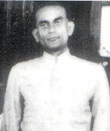Related Research Articles
Nurul Amin was a Pakistani politician and jurist who served as the eighth prime minister of Pakistan from 7 December to 20 December 1971. His term of only 13 days as prime minister was the shortest served in Pakistani parliamentary history. He was also the only vice president of Pakistan.

Abul Kasem Fazlul Huq, popularly known as Sher-e-Bangla, was a Bengali lawyer and politician who presented the Lahore Resolution which had the objective of creating an independent Pakistan. He also served as the first and longest Prime Minister of Bengal during the British Raj.

Muhammad Mansur Ali was a Bangladeshi politician who was a close confidant of Sheikh Mujibur Rahman, the founding leader of Bangladesh. A senior leader of the Awami League, Mansur also served as the Prime Minister of Bangladesh in 1975.

Nawab Sir Khwaja Salimullah Bahadur was the fourth Nawab of Dhaka and one of the leading Muslim politicians during the British rule in India.

Ataur Rahman Khan was a Bangladeshi lawyer, politician and writer, and served as Chief Minister of East Pakistan from 1 September 1956 – March 1958, and as the Prime Minister of Bangladesh from 30 March 1984 to 9 July 1986.

Fazlul Quader Chowdhury was a Bengali politician who served as the 5th speaker of the National Assembly of Pakistan from East Pakistan. He belonged to Ayub Khan's Convention Muslim League. He was also the acting president of Pakistan from time to time when Ayub Khan left the country. His elder brother Fazlul Kabir Chowdhury was the leader of the opposition in East Pakistan assembly. Quader was preceded by Maulvi Tamizuddin Khan of Awami League.

The Krishak Sramik Party was a major anti-feudal political party in the British Indian province of Bengal and later in the Dominion of Pakistan's East Bengal and East Pakistan provinces. It was founded in 1929 as the Nikhil Banga Praja Samiti to represent the interests of tenant farmers in Bengal's landed gentry estates. Sir Abdur Rahim was its first leader. A. K. Fazlul Huq was elected leader in 1935 when the former was appointed as the president of the Central Legislative Assembly of India. In 1936, it took the name of Krishak Praja Party and contested the 1937 election. The party formed the first government in the Bengal Legislative Assembly. After the partition of British India, it was reorganized as the Krishak Sramik Party to contest the 1954 election, as part of the United Front. The coalition won the election and formed the provincial government in the East Bengal Legislative Assembly.

The Nizam-e-Islam Party or simply Nizam-e-Islam, is a religious-political party in Bangladesh and Pakistan. The party was founded in the city of Kishoreganj in 1952, by the Islamic scholars of erstwhile East Bengal, Pakistan as an offshoot of the Jamiat Ulema-e-Islam. It was one of the four political parties belonging to the United Front alliance which defeated the Muslim League in the 1954 elections.

Ahmed Hossain, minister for agriculture, forest and fisheries department in Huseyn Shaheed Suhrawardy's cabinet 1946/47, chairman of Rangpur District Board, minister for agriculture in East Pakistan in Abu Hossain Sarkar's cabinet 1955–56. Represented his Shagata and Fulchari constituency, of Gaibandha District as MLA and MP from 1937 to 1958.

Mahmud Ali was a progressive leftist Pakistani politician known for his agrarian politics. He was part of the Freedom Movement and played an important role during the Sylhet referendum which led to its merger with East Bengal. As member of Pakistan's Second Constituent Assembly he demanded the recognition of Bengali as one of the national languages of Pakistan and advocated the cause through his newspaper, the Nao Belal. He strongly opposed the 'One Unit' scheme and voted against the merger in 1956. After the dissolution of the assembly and abrogation of the 1956 Constitution he worked towards the restoration of provinces and a parliamentary form of government based on adult franchise.
Ashrafuddin Ahmad Chowdhury was a Bengali politician who had served as general secretary of the Congress Party's Bengal branch, member of the East Bengal Legislative Assembly and later as the education minister of Pakistan. He was an advocate of Huseyn Shaheed Suhrawardy's United Bengal proposal.
Musharraf Hussain was an Indian politician. He was a minister in the Bengal Legislative Assembly and was later a member of the West Bengal Legislative Assembly.
Adeluddin Ahmad was a Bangladeshi lawyer and politician.
Muzaffar Ahmed was a Bangladeshi politician and professor. He was an advisor of Provisional Government of Bangladesh during war time in 1971. He was the president of Bangladesh National Awami Party (Pro-Moscow).
Khawaja Ahmed was a Bangladeshi politician and journalist. He participated in the Bangladesh Liberation War and served in the 1st National Parliament of Bangladesh.

Abdullah Al Mahmood was a Bengali politician and lawyer who served as the minister of industries and natural resources of Pakistan.
Azizuddin Ahmad was a Member of the 1st National Assembly of Pakistan as a representative of East Pakistan.
Ramizuddin Ahmed was a social worker and politician.
Fazlur Rahman was a Pakistani Bengali politician and lawyer. He was the first Education Minister of Pakistan and a member of the 1st and 2nd National Assemblies of Pakistan.
Muhammad Hasanuzzaman was a Bengali educationist and politician. He served as a member of the Bengal Legislative Assembly.
References
- ↑ Debates. Official Report. Pakistan Constituent Assembly (1947-1954). 1948. p. 122. Retrieved 5 March 2017.
- 1 2 3 4 Nawaz, Ali. "Ahmad, Mafizuddin". Banglapedia. Retrieved 5 March 2017.